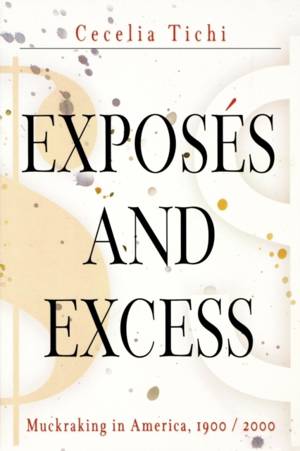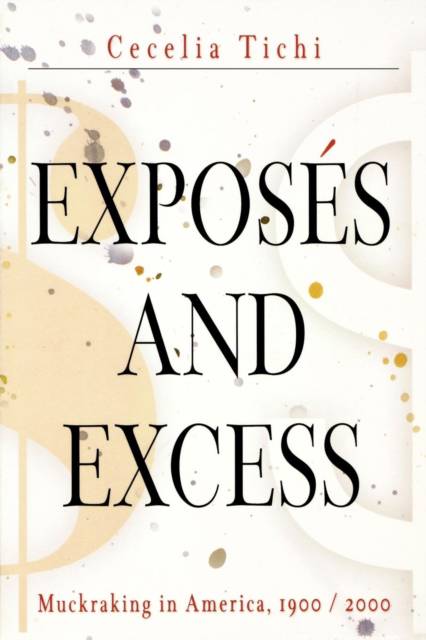
- Retrait gratuit dans votre magasin Club
- 7.000.000 titres dans notre catalogue
- Payer en toute sécurité
- Toujours un magasin près de chez vous
- Retrait gratuit dans votre magasin Club
- 7.000.0000 titres dans notre catalogue
- Payer en toute sécurité
- Toujours un magasin près de chez vous
Description
Exposés and Excess Muckraking in America, 1900 / 2000 Cecelia Tichi "Rich and nuanced readings of works by muckrakers at both ends of the twentieth century."--Daniel Horowitz, Smith College "A quietly eloquent intervention in contemporary critical practice."--American Literature "Tichi provides rich and nuanced readings of works by muckrakers at both ends of the twentieth century, plus a stunning cultural analysis of the booming, insecure world in the U.S., c. 1980-2000. She shows what it means to think of noncanonical texts in multiple ways, including those shaped by literary theory. Finally, she offers wonderful insights into the process by which journalists emerge as writers, and into the problematic differences between journalism and literature."--Daniel Horowitz, Smith College "Tichi shows us the art of muckraking narrative, and how artful it must be. She shows us, too, the state we are in as a society. The cumulative evidence constitutes a devastating critique of where we are as a culture, where we are in the world, and where we are going. Tichi writes with exuberance, but if we take her seriously, this is a profoundly troubling book."--Miles Orvell, Temple University "Tichi makes it clear that she sometimes becomes depressed at the corruption and insensitivity raining down from the top of U.S. society, including the White House, and would like to see more journalists exposing problems. But despite legitimate reasons for concern, her book is largely an affirmation of contemporary investigative journalism. And that's good news."--Christian Science Monitor "Intriguing. . . . Tichi has a firm grasp on contemporary culture in the very early and late 1900s. . . . As much contemporary culture and sociology as journalism."--Choice From robber barons to titanic CEOs, from the labor unrest of the 1880s to the mass layoffs of the 1990s, two American Gilded Ages--one in the early 1900s, another in the final years of the twentieth century--mirror each other in their laissez-faire excess and rampant social crises. Both eras have ignited the civic passions of investigative writers who have drafted diagnostic blueprints for urgently needed change. The compelling narratives of the muckrakers--Upton Sinclair, Ida Tarbell, Lincoln Steffens, and Ray Stannard Baker among them--became bestsellers and prizewinners a hundred years ago; today, Cecelia Tichi notes, they have found their worthy successors in writers such as Barbara Ehrenreich, Eric Schlosser, and Naomi Klein. In Exposés and Excess Tichi explores the two Gilded Ages through the lens of their muckrakers. Drawing from her considerable and wide-ranging work in American studies, Tichi details how the writers of the first muckraking generation used fact-based narratives in magazines such as McClure's to rouse the U.S. public to civic action in an era of unbridled industrial capitalism and fear of the immigrant "dangerous classes." Offering a damning cultural analysis of the new Gilded Age, Tichi depicts a booming, insecure, fortress America of bulked-up baby strollers, McMansion housing, and an obsession with money-as-lifeline in an era of deregulation, yawning income gaps, and idolatry of the market and its rock-star CEOs. With passion and wit, Exposés and Excess brings a literary genre up to date at a moment when America has gone back to the future. Cecelia Tichi is William R. Kenan, Jr. Professor of English, Vanderbilt University, and has served as president of the American Studies Association. Among her books are Embodiment of a Nation: Human Form in American Places and High Lonesome: The American Culture of Country Music. Personal Takes 2003 248 pages 6 x 9 14 illus. ISBN 978-0-8122-1926-5 Paper $24.95s £16.50 ISBN 978-0-8122-0375-2 Ebook $24.95s £16.50 World Rights American History, Cultural Studies
Spécifications
Parties prenantes
- Auteur(s) :
- Editeur:
Contenu
- Nombre de pages :
- 248
- Langue:
- Anglais
- Collection :
Caractéristiques
- EAN:
- 9780812219265
- Date de parution :
- 27-04-05
- Format:
- Livre broché
- Format numérique:
- Trade paperback (VS)
- Dimensions :
- 150 mm x 224 mm
- Poids :
- 362 g

Les avis
Nous publions uniquement les avis qui respectent les conditions requises. Consultez nos conditions pour les avis.






